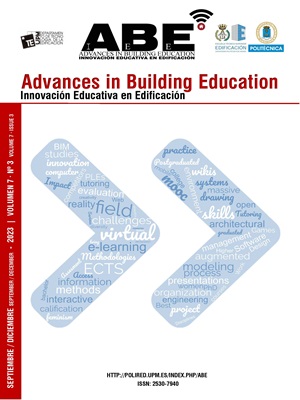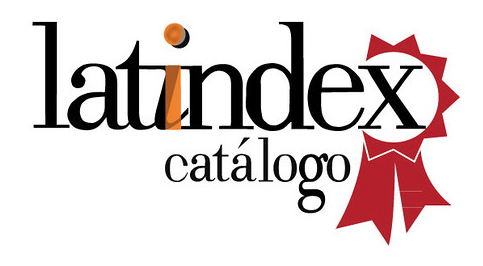Mainstreaming technical competences in professional projective capacity, within integration of Bachelor's and Master's degrees in Architecture training to professional itinerary = Integración del Grado y Máster en Arquitectura en un itinerario a la profesión mediante la inclusión de competencias técnicas de capacidad proyectiva profesional
DOI:
https://doi.org/10.20868/abe.2023.3.5204Palabras clave:
Profesional, carrera, currículo integrado, itinerario, proyectivo, Professional, career, integrated curriculum, itinerary, projectiveResumen
La metodología IPBL está orientada según una actuación realista que sitúa al estudiante en un proceso en condiciones similares a las que se va a enfrentar en un encargo profesional real. Desde el curso 2020-2021, la Escuela de Arquitectura de la Universidad Europea de Canarias se enfrenta a una serie de retos globales propuestos por diferentes organismos, retos dentro de los cuales se integran diferentes asignaturas de todas las áreas de conocimiento de la Arquitectura. Integrando en un proyecto global el desarrollo de las competencias profesionales completas en Arquitectura -aquellas necesarias para desarrollar un proyecto básico y de ejecución- en asignaturas del Grado en Fundamentos de la Arquitectura y del Máster en Arquitectura. Para ello, se han distribuido a través de diversas asignaturas conectadas entre el grado y el máster, potenciando la adquisición de competencias profesionales y competencias personales. La integración técnica de ambas titulaciones desde la capacidad documental profesional del proyecto básico y de ejecución ha sido estudiada por comparación directa tanto en secuencia temporal de implantación, con notables mejoras de calidad documental técnica, autopercepción y capacidad de respuesta intuitiva a proyecto.
Abstract
IPBL methodology is based on a realistic approach that places students in a process in conditions similar to those they will face in a real professional assignment. From the academic year 2020-2021, the School of Architecture of the UEC is facing a series of global challenges proposed by different organisations, challenges within which different subjects from all areas of knowledge of Architecture are integrated. Integrating the multiple challenges demanded by project-based learning, the development of the complete professional competences in Architecture -those necessary to develop a basic Architectural Project and its execution- in subjects of the Bachelor's Degree in Foundations of Architecture and the Master's Degree in Architecture have been distributed through different subjects connected between the Bachelor's Degree and the Master's Degree, promoting the acquisition of professional and personal competences. The technical integration of both degrees from the professional documentary capacity of the basic and execution project has been studied by direct comparison both in time sequence of implementation, with notable improvements in technical documentary quality, self-perception and intuitive response capacity to the project.
Descargas
Referencias
Pertusa, H. (2023). La empresa humanista en la era de la complejidad. Human Review. International humanities, 17(3), 1-11. DOI: 10.37467/revhuman.v12.4734
Clavería, A. (2017). El arquitecto: formación, competencias y práctica profesional. ACE Architecture, city and enviroment, 12(34), 301-320. DOI: 10.5821/ace.12.34.5296
De la Portilla, C. (2023). Cómo vivir de la Arquitectura. Madrid: Arpa Práctica. ISBN 978-84-19662-01-9
Eurydice. (2021). The structure of the European education systems 2021/22: schematic diagrams, Publications Office of the European Union, 2021. Brussels: European Commission, European Education and Culture Executive Agency. DOI:10.2797/972889
Navarro-Astor, E., & Caven, V. (2012). Architects in Spain: A profession under risk. In 28th Annual Association of Researchers in Construction Management (ARCOM) Conference. Association of Researchers in Construction Management, Edinburgh. 577-587.
Arquia. (2020). VIII Encuesta a Estudiantes de Arquitectura. Madrid: Fundación Arquia.
López Arquillo, J.D; Oliveira, C; Cadenas Borges, M; Serrano González, J. (2023). Integración de proyectos transdisciplinares con metodología ICBL mediante la plataforma bechallenge. Actas de las XVII Jornadas de Innovación Universitaria. 147-149. ISBN: 978-84-1170-033-7.
González, C. (2014). Strategies on creativity in Higher Education: design thinking, game-based and project-based learning. RED, revista de educación a distancia (40), 7-22. http://hdl.handle.net/10201/46543.
Baeza, A. C. (2017). Proyectar es investigar. Palimpsesto, (17).
Lizzio, A., Wilson, K., & Simons, R. (2002). University students' perceptions of the learning environment and academic outcomes: implications for theory and practice. Studies in Higher education, 27(1), 27-52.
Nava, M. &. (2009). Problem based learning: an experience in teaching occupational health. Journal of the faculty of Medicine, 49(004), 146-150.
Correia, A., Oliveira, C., & Pereira, R. (2017). From emotions to place attachment. Co-creation and well-being in tourism, 163-177. DOI: 10.1007/978-3-319-44108-5_13
Rebolledo, D., Castillo, H., & Rubí, P. (2017). Team based learning: an educational methodology facilitating student learning. Journal of Health Sciencies Education (14), 144-148.
Andreasen, M. M., Hansen, C. T., & Cash, P. (2015). Conceptual design. Cham, Switzerland: Springer. 89-92. DOI: 10.1007/978-3-319-19839-2
Sánchez Ostiz, A. (1995). La calidad en la redacción del proyecto de arquitectura. RE. Revista de edificación (20), 7-14. DOI: 10.15581/020.20.34931
McClean, D., & Hourigan, N. (2013). Critical dialogue in architecture studio: Peer interaction and feedback. Journal for Education in the Built Environment, 8(1), 35-57. DOI: 10.11120/jebe.2013.00004
Rodríguez, C., Hudson, R., & Niblock, C. (2018). Collaborative learning in architectural education: Benefits of combining conventional studio, virtual design studio and live projects. Education Technology, 49(3), 337-353. DOI: 10.1111/bjet.12535
Smith, D., & Lilly, L. (2016). Understanding Student Perceptions of Stress in Creativity–Based Higher Education Programs: A Case Study in Interior Architecture. Journal of Interior Design, 41(2), 39-56.
Deutsch, R. (2020). Think Like an Architect: How to Develop Critical, Creative and Collaborative Problem-Solving Skills. RIBA Publications, 89-90.
Henricksen, D., Mehta, R., & Mehta, S. (2019). Design thinking gives STEAM to teaching: A framework that breaks disciplinary boundaries. Steam education: theory and practice (12), 57-78.
Descargas
Publicado
Número
Sección
Licencia
ABE (Advances in Building Education / Innovación Educativa en la Edificación) no aplica cargo alguno a los autores por procesar o publicar un artículo y provee acceso abierto (Open Access) inmediato a su contenido. Todo el contenido está disponible gratuitamente sin cargo para el usuario o su institución. Se permite a los usuarios leer, descargar, copiar, distribuir, imprimir, buscar o vincular a los textos completos de los artículos, o utilizarlos para cualquier otro propósito lícito, sin pedir permiso previo del editor o el autor. Esto está de acuerdo con la definición de acceso abierto de la BOAI.
1. Los autores conservan los derechos de autor y garantizan a la revista el derecho de una Licencia Creative Commons Atribución / No Comercial / No Derivadas 4.0 Internacional (CC BY NC ND) que permite a otros compartir el trabajo con un reconocimiento de la autoría y uso no comercial.
2. Los autores pueden establecer por separado acuerdos adicionales para la distribución no exclusiva de la versión de la obra publicada en la revista (por ejemplo, situarlo en un repositorio institucional o publicarlo en un libro).
Salvo indicación contraria, todos los contenidos de la edición electrónica se distribuyen bajo una licencia de uso y distribución “Creative Commons".














